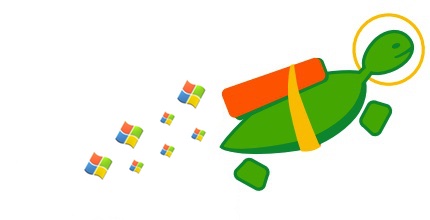
When I was at HP Discover last December, I noticed a few people running around wearing Cumulus Networks shirts. That had me a bit curious, as Cumulus isn’t usually on the best of terms with traditional networking vendors unless they have a partnership. After some digging, I found out that HP would be announcing a “britebox” branded whitebox switch soon running Cumulus Linux. I wrote a post vaguely hinting about this in as much detail as I dared leak out.
No surprise that HP has formally announced their partnership with Cumulus. This is a great win for HP in the long run, as it gives customers the option to work with an up-and-coming network operating system (NOS) along side HP support and hardware. Note that the article mentions a hardware manufacturing deal with Accton, but I wouldn’t at all be surprised to learn that Accton had been making a large portion of their switching line already. Just a different sticker on this box.
Written Once, Runs Everywhere
The real winner here is Cumulus. They have partnered with Dell and HP to bring their NOS to some very popular traditional network vendor hardware. Given that they continue to push Cumulus Linux on traditional whitebox hardware, they are positioning themselves the same way that Microsoft did back in the 1980s when the IBM Clone PC market really started to take off.
Microsoft’s master stroke wasn’t building an empire around a GUI. It was creating software that ran on almost every variation of devices in the market. That common platform provided consistency for programmers the world over. You never had to worry about what OS was running on an IBM Clone. You could be almost certain it was MS-DOS. In fact, that commonality of platform is what enabled Microsoft to build their GUI interface on top. While DOS was eventually phased out in favor of WinNT kernels in Windows the legacy of DOS still remains on the command line.
Hardware comes and goes every year. Even with device vendors that are very tied to their hardware, like Apple. Look at the hardware differences between the first iPhone and the latest iPhone 6+. They are almost totally alien. Then look at the operating system running on each of them. They are remarkably similar, especially amazing given the eight year gap between them. That consistency of experience has allowed app developers to be comfortable writing apps that will work for more than one generation of hardware.
Bash Brothers
Cumulus is positioning themselves to do something very similar. They are creating a universal NOS interface to switches. Rather than pinning their hopes on the aging Cisco IOS CLI (and avoiding a potential lawsuit in the process), Cumulus has decided to go with Bash. Bash is almost universal for those that work on Linux, and if you’re an old school UNIX admin it doesn’t take long to adapt to Bash either. That common platform means that you have a legion of trained engineers and architects that know how to use your system.
More importantly, you have a legion of people that know how to write software to extend your system. You can create Bash scripts and programs to do many things. Cumulus even created ifupdown2 to help network admins with simplifying network interface administration. If you can extend the interface of a networking device with relative ease, you’ve started unlocking the key to unlimited expansion.
Think about the number of appliances you use every day that you never know are running Linux. I said previously that Linux won the server war because it is everywhere now and yet you don’t know it’s Linux. In the same way, I can see Cumulus negotiating to get the software offered as an option for both whitebox and britebox switches in the future. Once that happens, you can start to see the implications. If developers are writing apps and programs to extend Cumulus Linux and not the traditional switch OS, consumers will choose the more extensible option if everything else is equal. That means more demand for Cumulus. Which pours more resources into development. Which is how MS-DOS took over the world and led to Windows domination, while OS/2 died a quiet, protracted death.
Tom’s Take
When I first tweeted my thoughts about Cumulus Networks and their potential rise like the folks in Redmond, there was a lot of pushback. People told me to think of them more like Red Hat instead of Microsoft. While their business model does indeed track more closely with Red Hat, I think much of this pushback comes from the negative connotations we have with Windows. Microsoft has essentially been the only game in the x86 market for a very long time. People forget what it was like to run BeOS or early versions of Slackware. Microsoft had almost total domination outside the hobby market.
Cumulus doesn’t have to unseat Cisco to win. They don’t even have to displace the second or third place vendor. By signing deals with as many people as possible to bring Cumulus Linux to the masses, they will win in the long run by being the foundation for where networking will be going in the future.
Editor Note: A previous version of this article incorrectly stated that Cumulus created ifupdown, when in fact they created ifupdown2. Thanks to Matt Stone (@BigMStone) and Todd Craw (@ToddMCraw) for pointing this out to me.


Ivan posted an interesting talk from one of the Cumus guys earlier. Warning: Noe techtalk – just the guy explaing their “mission” thught it was interesting nonetheless: https://vimeo.com/119402928
jes, and configs all over the place. :<
bash is used, but routing is configured via quagga, with a CLI that is a clone of IOS (plus many nice features). Or am I missing something?